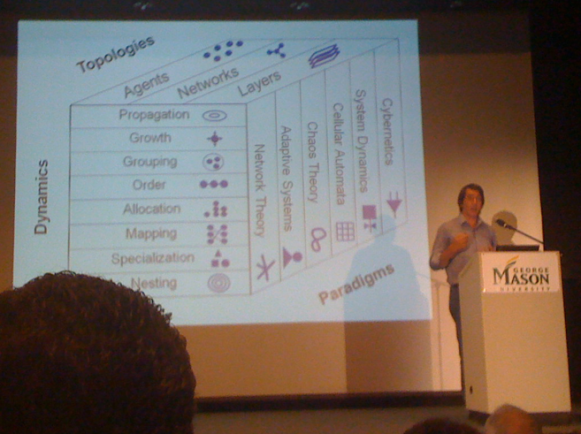It’s not everyday that one gets to swoon as a big time fan boy. Will Wright spoke at the Innovations and e-Learning Symposium and I had the chance to stake out a spot right in the center of the room and soak up a bit of Wright’s visionary gamer visions. Beyond making some of the biggest games of all time (SimCity, The Sims, and Spore to name a few), Wright is also one of the most thoughtful game thinkers around. Below are a few of the pieces in his approach to his sort of games that I think are the most interesting/ innovative/ and crucial.

1. Simulation itself is a powerful, and constant way in which everyone understands the world. We are always creating models of what will happen, how people will react, based on our schema’s and our experiences which ultimately inform our actions.
2. The games he builds create possibility spaces. You make your own stories, you have the ability to restart and take a different branch. On a very basic level this like the branching narrative you get in those old chose your own adventure novels. The bigger sandbox worlds we see in things like Civilization, The Sims, and GTA offer much more sophisticated multidimensional trees, but the concept is the same.
3. For Will when gamers play games they are actually reverse engineering the game as they play it. While a parent watching their child play Wolfenstein might be taken back by the violence Wright suggests that Kids see the higher level of abstraction the power-ups, a door to the next level. In their minds its more like playing chess. They are abstracting the grammar of these game worlds. Inside the mind of the player they are honing in on the elements, the design decisions, the mechanics that make the game work and testing their theories, making choices and taking the feedback the game provides to refine and improve those theories. In his opinion the “Best games are the games you keep playing after you walk away from your computer. The games you keep playing through in your own imagination.”
I have a lot of mental digestion to do on this talk, but I have one first thought. If we need to think seriously about the role of the reader when studying a text that need is at least ten times greater when studying the relationship between the gamer and the game. The possibilities afforded by the game are just so much larger. I have some more thoughts on this but I will pick them up later.
Leave a comment